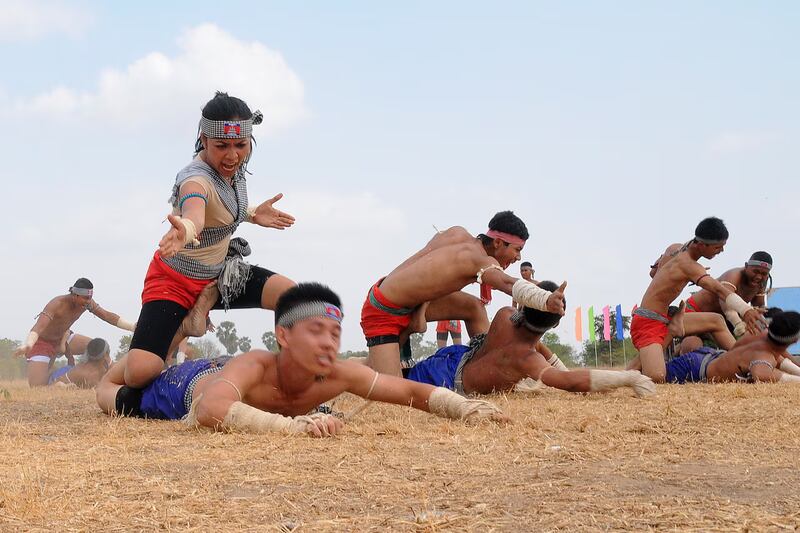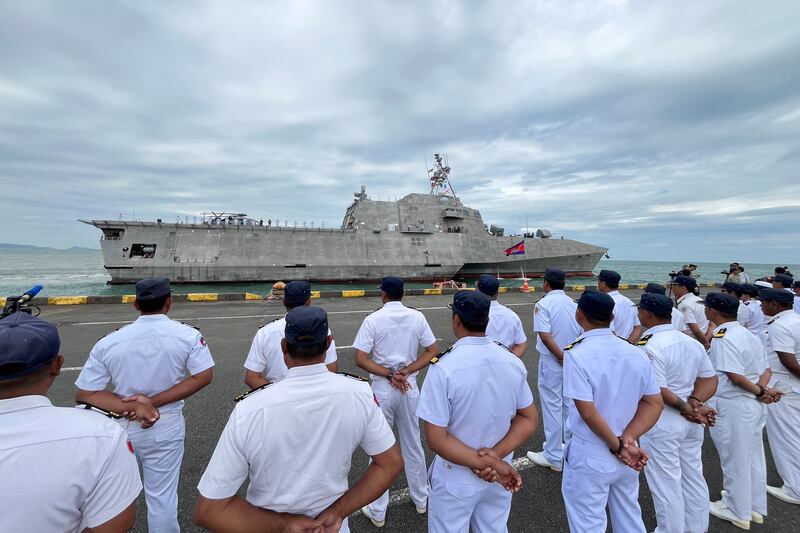The Cambodian military has asked the U.S. to consider the resumption of Angkor Sentinel, an annual joint military exercise that Phnom Penh called off in 2017 as it strengthened ties with China.
Gen. Vong Pisen, commander-in-chief of the Royal Cambodian Armed Forces, or RCAF, requested during a meeting with a visiting U.S. general “a review and discussion on the possibility of resuming joint military training, such as the Angkor Sentinel exercise,” according to a statement from the RCAF.
Gen. Ronald Clark, commanding general of the U.S. Army Pacific, is in Cambodia on a two-day official visit. On Monday, he “held constructive meetings with Cambodian Prime Minister Hun Manet and top military leadership” including Defense Minister Tea Seiha and Gen. Vong Pisen, the U.S. Army said.
Clark and Cambodian officials “explored ways to enhance the U.S.-Cambodia bilateral defense relationship to promote Indo-Pacific peace and security.”
“Talks covered military training exchanges focused on disaster relief, United Nations peacekeeping, and efforts to make Cambodia mine-free,” the U.S. Army said.

Cambodia decided to cancel the Angkor Sentinel joint drills with the U.S. military after seven iterations, the last of which was in 2016.
Instead, it has been holding a regular joint exercise called Golden Dragon with the Chinese military.
U.S.-Cambodia ties became frosty partly because of U.S. criticism of Phnom Penh’s human rights violations and the repression of the political opposition.
Last December, a U.S. naval vessel was allowed to visit Cambodia for the first time in eight years.
Suspicion over Ream naval base
The apparent sign of thaw in military-to-military relations may have something to do with the new administration in the United States said Paul Chambers, an analyst at the Center of ASEAN Community Studies at Naresuan University in Thailand.
“Under President Trump, the human rights conditionality for aid [for Cambodia] may be lifted,” Chambers told Radio Free Asia.
Another analyst, Kin Phea, president of the International Relations Institute at the Royal Academy of Cambodia, suggested that Cambodia should clarify U.S. concerns about the Ream naval base during Clark’s visit.
He was quoted by the Phnom Penh Post as saying that the two sides should have held frank discussions “to address past mistrust.”
RELATED STORIES
China sends 2 more ships to Cambodia’s Ream naval base
Any foreign navy can visit Ream naval base: Cambodia’s deputy PM
US navy ship on first visit to Cambodia in 8 years
China and Cambodia began developing a naval base in Ream near Sihanoukville on the southwest coast with Chinese funding in June 2021.
U.S. officials said there are concerns over China’s permanent and exclusive presence at the base, which saw a rapid expansion and extensive upgrade over the past year.
There are indications that the new main part of the base developed by China is near completion. The Chinese navy is planning to give Cambodia two warships together with a new deep-draft pier.
Cambodian officials have repeatedly denied that Ream would serve as an overseas base for the Chinese navy.

Cambodia’s neighbors, especially Vietnam, are also worried about China establishing a military presence close to them as well as the disputed waters of the South China Sea.
Cambodian leader Hun Sen and his son, Prime Minister Hun Manet, have just been to Vietnam to attend meetings with Vietnamese leaders and a Vietnam-Laos-Cambodia summit.
It is unclear what they discussed in Ho Chi Minh City but a communique issued after the summit said that none of them should allow an outside force to use their territory to threaten the security of the others.
Edited by Mike Firn
